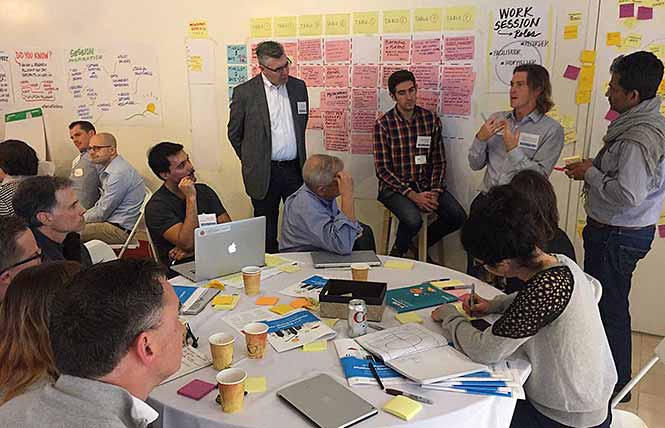Future Now
The IFTF Blog
IFTF awards Fellowships worldwide to help create a Positive Gig Economy
Teams in Ireland, Italy, Spain and the U.S. awarded fellowships to tackle challenges and seize opportunities of on-demand economy
Palo Alto, Calif., Feb. 13, 2017—Institute for the Future (IFTF) today awarded four fellowships to teams across the world to work on projects aimed at protecting workers in the on-demand economy while ensuring start-ups and investors remain profitable. The projects range from connecting people with disabilities to employers, to creating a platform model that combines the worker protections found in co-ops with the flexibility inherent in existing high-growth platforms.
The projects grew out of IFTF’s Positive Platforms Design Jam, held Nov. 30-Dec. 1, 2016 at its Palo Alto headquarters and at IFTF affiliates around the world.
The Positive Platforms Design Jam was part of IFTF’s Workable Futures Initiative, established as a call-to-action for policymakers, platform developers and civic and labor leaders to help ensure the growing on-demand economy protects workers while being profitable. During the Design Jam, participants brainstormed ideas to tackle the unique issues presented by the platform economy as described in IFTF’s report Work, Interrupted: The New Labor Economics of Platforms.

Participants were then invited to submit proposals and a panel of experts selected the following four projects out of 24 proposals submitted to develop further:
- Chiara Agamennone, Daniele Bucci, Marta Mainieri and Valeria Loreto of Milan, Italy. Their project, “Mapping Positive Platforms Identity,” aims to develop guidelines and a common language for what defines a positive platform.
- Denise Cheng, Matt Schaefer and Joshua Danielson of the United States. Their project, “Recruiting Worker-Owners to Loconomics Co-operative, an Existing Positive Platform,” will research the psychology behind skepticism about joining co-ops and test a new marketing campaign to recruit people to co-ops, using Loconomics, an early stage platform co-op, as a benchmark for the effectiveness of the campaign.
- David Pollard, Jim Hyde and Reuben Jayawardene of Dublin, Ireland. Their project, “Getting Learners into Direct Employment Platforms,” aims to create an information and jobs platform to link jobseekers with disabilities, anywhere, with real-time employers and relevant support workers.
- Ana Manzandeo and Alicia Trepat of Barcelona, Spain. Their project, “Hybridizing Platform Co-ops with Open Participatory Networks: Building a Framework for Positive Platforms,” will focus on creating a platform governance framework that combines the worker security and rights of co-ops with the flexibility and adaptability of open participatory networks.
After an evaluation of all of the applicants, IFTF picked the above projects on the degree to which IFTF may be able to amplify their work, the strength of their teams, the feasibility of their proposal and the scale of the positive impact they could have for workers.
![]() “These are very exciting ideas that are fundamental to IFTF’s Workable Futures Initiative, which aims to help create platforms that not only maximize profits for their owners but also provide dignified and sustainable livelihoods for those who work on them,” said Marina Gorbis, IFTF’s executive director. “We are proud to support these creative people as they work toward making a real difference in this emerging way of working.”
“These are very exciting ideas that are fundamental to IFTF’s Workable Futures Initiative, which aims to help create platforms that not only maximize profits for their owners but also provide dignified and sustainable livelihoods for those who work on them,” said Marina Gorbis, IFTF’s executive director. “We are proud to support these creative people as they work toward making a real difference in this emerging way of working.”
Each fellowship includes a $9,000 stipend to help the winners develop their ideas over three months. At the end of the fellowship, the fellows will deliver reports and prototypes to IFTF for next steps.
For more information
- Contact Erin Musgrave at 530-864-7014 | [email protected]
- Visit IFTF's WorkableFutures.org



